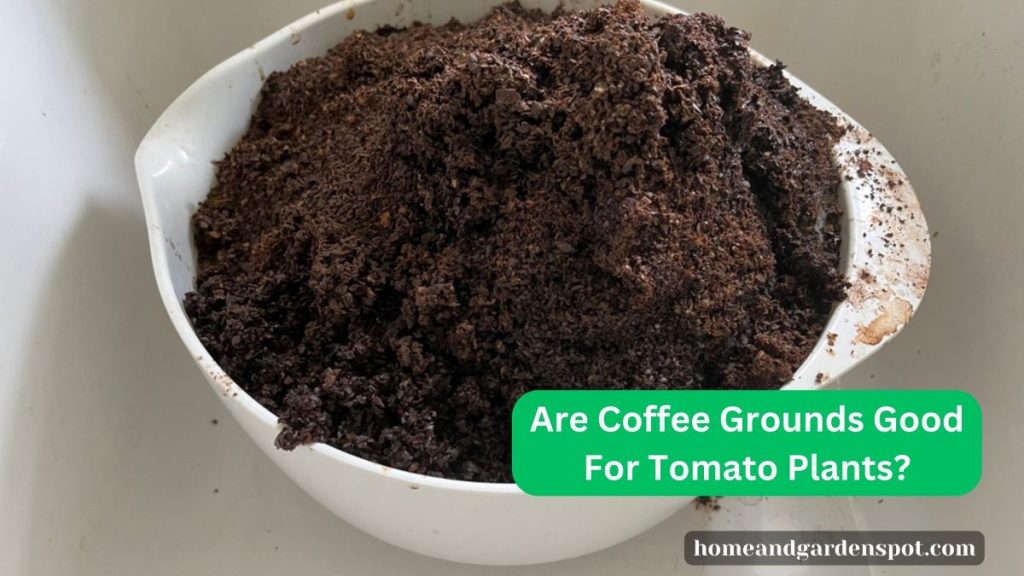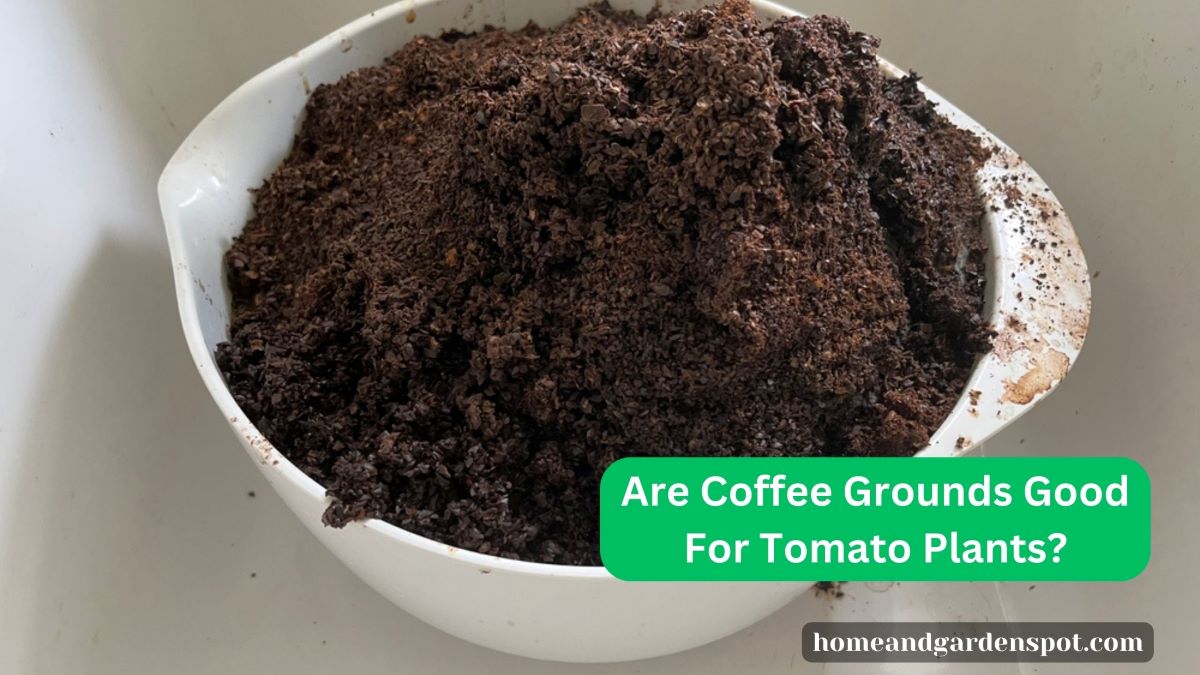If you are a gardener, farmer, or just curious, then you know that the quest for nurturing your plants to perfection never ends.
There is always the constant need to look for simple, sustainable, and cost-effective methods to help your beloved garden thrive.
One such garden hack that’s been gaining attention is using coffee grounds for tomato plants.
Home gardeners have long turned to coffee grounds to tackle an array of problems. There are dozens of claims regarding the benefits of coffee for tomatoes, such as providing nutrients and serving as mulch.
With a number of pieces of advice on how to effectively nourish your tomato plants and which products yield the finest outcomes, a pressing question comes up: are coffee grounds good for tomato plants?
In this blog post, we’ll take a closer look at how this question became popular and if there are any truths to the effectiveness of coffee grounds for tomato gardens.
We’ll unveil the science behind it, share practical tips, and reveal the do’s and don’ts to ensure your tomato plants flourish.

Are Coffee Grounds Good For Tomato Plants?
When it comes to using coffee grounds in your tomato garden, there’s an ongoing debate. Some say it’s a game-changer, while others remain skeptical.
While science hasn’t handed us strong proof that coffee grounds can supercharge your tomato plant’s growth or yield more juicy tomatoes, there is a scientific basis for the optimism.
Used coffee grounds do something fascinating to your soil as they nudge it towards being slightly acidic. This little pH shift happens to be something that tomato plants absolutely adore.
Not only that, but coffee grounds also bring in a decent amount of nutrients and organic material, giving your soil a nutritious boost.
In addition, others claim that coffee grounds might help keep some unwanted critters at bay, thereby acting as a natural pest repellent.
So, in essence, coffee grounds aren’t a guaranteed golden ticket to tomato paradise, but they do offer some pretty enticing benefits that should interest any tomato farmer.
Benefits of Using Coffee Grounds on Tomato Plants
As mentioned earlier, coffee grounds have a strong basis for being used on tomato plants. These include:
1. Fertilizing Your Tomato Plants
Coffee grounds are like a secret nutrient stash for your tomato plants. They’re rich in essential elements like nitrogen, potassium, and phosphorus, all of which are vital for robust plant growth.
As you sprinkle used coffee grounds around the base of your tomatoes, they gradually release these nutrients into the soil.
This slow-release process ensures a steady supply of nourishment, helping your tomato plants flourish and produce more delicious tomatoes.
2. Soil pH Regulation for Ideal Growth
Tomatoes prefer slightly acidic soil, and this is where coffee grounds come to the rescue.
When coffee grounds break down, they have an acidifying effect on the soil. This shift towards a slightly lower pH creates an environment that’s just right for your tomatoes to thrive.
It’s like tailor-made soil for your tomato plants, ensuring they can absorb nutrients efficiently and grow at their best.
3. Natural Pest Control
Surprisingly, coffee grounds can act as a natural barrier against certain garden pests.
Many critters dislike the texture and scent of coffee grounds, making them think twice before making a meal out of your tomato plants.
While it’s not a foolproof pest control method, it can certainly provide an extra line of defense for your garden.
4. Weed Suppression
Unwanted weeds can be a real headache in your tomato garden, competing for nutrients and space.
Coffee grounds can help in the battle against weeds. When spread over the soil surface, they form a mulch that inhibits weed growth.
This means less time pulling weeds and more time enjoying your thriving tomato plants.
5. Accelerated Growth Rate
The nutrients in coffee grounds, along with their soil-enhancing qualities, can lead to an accelerated growth rate for your tomato plants.
With the right care and proper use of coffee grounds, you may notice your tomato plants reaching maturity and bearing fruit a bit sooner than expected.
6. Encouraging Earthworm Activity
Earthworms are like nature’s gardeners, and they play a crucial role in maintaining healthy soil.
Coffee grounds can attract these helpful creatures to your garden. Earthworms love the organic matter in coffee grounds.
As they move through the soil, they create channels that improve aeration and water penetration, benefiting your tomato plants in the process.
7. Compost Enrichment
If you’re into composting, coffee grounds are a fantastic addition. They’re considered “green” compost material, meaning they’re rich in nitrogen.
When you add coffee grounds to your compost pile, they enhance the overall nutrient balance, making your compost even more beneficial for your tomato plants when it’s ready to use.
8. Reducing Harmful Fungi and Bacteria
Coffee grounds have been found to contain compounds with antifungal and antibacterial properties.
When used in your garden, they can help reduce the risk of certain harmful fungi and bacteria infecting your tomato plants.
While it’s not a substitute for proper plant care, it’s an added layer of protection for your precious tomatoes.
Ways to Prepare Coffee Grounds for Use on Tomato Plants
Here are some practical ways to harness the power of coffee grounds for your tomato plants:
1. Compost Enrichment
Blend coffee grounds with leaves or sawdust to create compost that’s a nutrient-rich elixir for your tomatoes.
This compost not only feeds your plants but also battles fungal diseases. You can mix it into the soil or spread it as mulch around your tomato plants.
2. Mulching
Apply a thin, 1/2-inch layer of fresh coffee grounds around your tomato plants to lock in moisture.
Additionally, coffee grounds contain natural compounds that can deter weed seeds from sprouting, making your gardening life easier.
3. Soil Amendment
Planting your tomatoes with coffee grounds can be a game-changer. It encourages the growth of beneficial microorganisms in the soil.
Even earthworms are coffee fans, as they consume the grounds and burrow them deeper into the soil, which ultimately improves the soil structure.
4. As Liquid Fertilizer
Yes, you can brew up a liquid fertilizer using your used coffee grounds. Simply add two cups of coffee grounds to a generous five gallons of water.
This “coffee tea” can be used to water your tomato plants, giving them a nutrient-packed drink to boost their growth.
How to Use Coffee Grounds in Tomato Gardening
Using coffee grounds in your tomato gardening is a simple and effective way to boost your tomato plants. Here’s a step-by-step guide to help you get started:
1. After brewing your daily coffee, save the used coffee grounds. You can collect them in a container or bag and store them in your garden.
2. Ensure your tomato garden is ready for planting. Tomato plants need well-drained, nutrient-rich soil and adequate sunlight.
3. Determine the amount of coffee grounds you need. For a small garden, a few cups of coffee grounds should suffice.
4. Sprinkle the collected coffee grounds on the soil surface around the base of your tomato plants. Make sure to spread them evenly without forming thick clumps.
5. Do not place coffee grounds in direct contact with the plant stems or leaves. Keep a small buffer to prevent potential mold growth or rot.
6. You can mix the coffee grounds with mulch, such as straw or leaves, to create a balanced layer that aids in weed suppression and moisture retention.
7. After applying the coffee grounds, water your garden as usual. This helps the grounds begin to break down and release nutrients into the soil.
8. Keep an eye on your tomato plants. If you notice any negative effects, such as yellowing leaves or mold growth, reduce the amount of coffee grounds you use.
Coffee grounds break down slowly, so it’s a good idea to reapply them periodically throughout the growing season. This can be every few weeks.
If you’re already using other fertilizers, consider combining coffee grounds with them for a well-rounded nutrient supply.
Using coffee grounds in tomato gardening is an eco-friendly and cost-effective way to enhance your plant’s growth and the quality of your tomato harvest. Just remember to apply them thoughtfully and monitor your plants for the best results.
Can Too Much Coffee Grounds Hurt Tomato Plants?
As with all good things, excessive use of coffee grounds can potentially have a negative impact on tomato plants if not used correctly.
Excessive use of coffee grounds can seriously impact your tomato yield. It might lower the number of tomatoes you get from your plants.
Also, using too many coffee grounds can result in tomato issues. They may suffer from discoloration, poor texture, and even a less appetizing flavor.
Coffee grounds are naturally slightly acidic, and using too much can tip the soil’s pH toward acidity. This can hinder nutrient absorption and impact overall plant growth, as tomatoes love a soil pH of 6.8.
When coffee grounds are left in big, soggy clumps, they can become a breeding ground for mold.
Mold near the plant stems is not only unsightly but also a potential source of diseases and damage to your tomatoes. In addition, too many coffee grounds can release nitrogen too quickly into the soil.
This can lead to excessive vegetative growth at the expense of fruit production, leaving you with lush plants but fewer tomatoes.
To prevent these negative impacts, it’s essential to use coffee grounds in moderation and take care to apply them properly.
Tips for proper application of Coffee Grounds
When applying coffee grounds to your tomato garden, these tips will help you do it effectively:
1. Ensure that the coffee grounds are spread evenly around the base of your tomato plants.
2. Don’t let the coffee grounds form thick clumps, as this can prevent even distribution and lead to mold growth.
3. Keep a small gap between the coffee grounds and the plant stems and leaves to prevent contact that may cause issues.
4. You can mix the coffee grounds with other organic matter, like mulch, for a balanced layer that assists with weed control and moisture retention.
5. Be mindful of the quantity. Too many coffee grounds can potentially harm your plants, so use them in moderation.
6. Water your garden after applying coffee grounds to help it break down and release nutrients into the soil.
Is Coffee Ground Better than Regular Fertilizers?
Whether coffee grounds are better than regular fertilizers for your garden depends on various factors, including your specific needs and preferences. Both methods have their pros and cons.
Regardless, some gardeners prefer to use both, incorporating coffee grounds for their organic matter and soil-enhancing properties, while using commercial fertilizers for precise nutrient control when necessary.
Conclusion
Over time, coffee grounds have emerged as a noteworthy ally in tomato gardening, bringing loads of benefits.
They offer a natural boost of nutrients, help maintain optimal soil conditions, and even fend off unwelcome pests.
However, it’s crucial to remember that the use of coffee grounds requires a delicate touch.

Leave a Reply